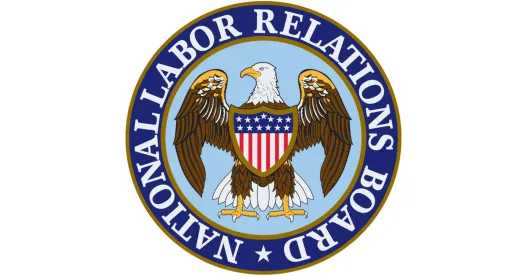-
Public sector employees who are non-members of a union cannot be legally required to pay agency or “fair share” fees as a condition of employment, the U.S. Supreme Court has held in a 5-4 ruling. Janus v. AFSCME Council 31, No. 16-1466 (June 27, 2018). The Court decided that a state’s enforcement of a provision in a collective bargaining agreement requiring non-members to pay such fees to the union as a condition of employment violates the Free Speech Clause of the First Amendment. Agency (or fair share) fees are paid by union-represented employees in lieu of dues. The fee represents only that percentage of dues used by the union to cover collective bargaining activities, not expenditures related to lobbying or political donations. A significant number of non-member public sector employees represented by unions likely will cease paying agency fees as a result of the ruling. For details of the Supreme Court’s decision, see our article, Supreme Court Rules Unconstitutional Mandatory Fees Imposed on Non-Union, Public Sector Employees.
-
National Labor Relations Board (NLRB) General Counsel Peter Robb has issued a memorandum setting out his vision for the use of Section 10(j) federal court injunctions. Section 10(j) injunctions are used to remedy alleged employer or union unfair labor practices quickly, before an unfair labor practice trial, which may not take place and be decided for many months. In the June 20 memorandum, Robb instructs NLRB Regional offices to continue considering the propriety of such interim injunctive relief in every case before the NLRB, with a renewed emphasis on the importance of speed in case processing. In a change to existing NLRB practice, the memorandum instructs Regional officials not to wait for a hearing in front of an administrative law judge before recommending cases as eligible for Section 10(j) relief. While the memorandum refers to statistics that, when analyzed, suggest that Robb has not sought Section 10(j) relief as often as his predecessor, Richard Griffin, the memorandum gives no indication it is Robb’s intention to seek Section 10(j) relief less often than Griffin.
-
NLRB Chairman John Ring has confirmed that the Board plans to use its rulemaking process to create a new joint employer standard. Ring made the statement in response to a May 29 letter from Democratic Senators Elizabeth Warren, Kirsten Gillibrand, and Bernie Sanders. In his response, Ring stated that a Notice of Proposed Rulemaking (NPRM) would be issued by this summer. He denied there was any intent to evade ethical restrictions in using the notice-and-comment rulemaking process, explaining that the rulemaking process would allow the NLRB to consider all views on what the joint employer standard ought to be. As part of the rulemaking process, the public will comment on proposed rules, and a majority of the five-member NLRB will need to approve any proposal. For more on Ring’s response, see our blog post, NLRB Chair Responds to Senators, Confirms NLRB Will Engage in Rulemaking for Joint Employer Standard.
-
The NLRB plans to offer early retirement and buyouts to certain agency staff as part of the Administration’s overall attempt to cut funding and freeze the agency’s growth, according to news reports. While the Board has not confirmed the reports, internal NLRB communications indicate the agency is in the early stages of a voluntary retirement plan under which each eligible early retiree will be offered up to $25,000. It appears the plan was put into motion by former NLRB Chair Philip Miscimarra and former General Counsel Richard Griffin. It is unclear how many Board staffers will receive voluntary retirement offers and what, if any, impact the departures will have on the Board’s operations.
-
The U.S. Court of Appeals for the Eighth Circuit has granted enforcement to an NLRB decision finding that a restaurant franchisee violated the National Labor Relations Act (NLRA) by retaliating against workers who participated in a 2015 strike. NLRB v. EYM King of Missouri LLC, No. 17-1944 (8th Cir. June 12, 2018). Employees staged a one-day strike in 2015 as part of a national “Fight for 15” campaign to raise the minimum wage to $15 an hour. The franchisee disciplined six employees who participated in the strike for failing to show up for work. The NLRB found the strike was protected concerted activity. Therefore, the employer’s discipline in response to the strike violated the NLRA. The Court, granting enforcement to the Board decision, agreed that the strike’s purpose was protected because of the connection to wages. The Court rejected the employer’s argument that the strike was an illegal “intermittent” strike, finding that previous work stoppages had been held when the restaurant was under different ownership. (According to the Board, “employees who strike multiple times risk being subject to discipline for having engaged in unprotected intermittent strikes, especially when the strikes relate to the same labor dispute.”)
Top Five Labor Law Developments for June 2018
Thursday, July 19, 2018
Current Public Notices
Published: 15 September, 2025
Published: 15 September, 2025
Published: 9 September, 2025
Published: 9 September, 2025
Published: 8 September, 2025
Published: 4 September, 2025
Published: 28 August, 2025
Published: 25 August, 2025
Published: 22 August, 2025
Published: 20 August, 2025
Published: 20 August, 2025
Published: 18 August, 2025
Published: 11 August, 2025
Published: 8 August, 2025
Published: 26 June, 2025








 />i
/>i

